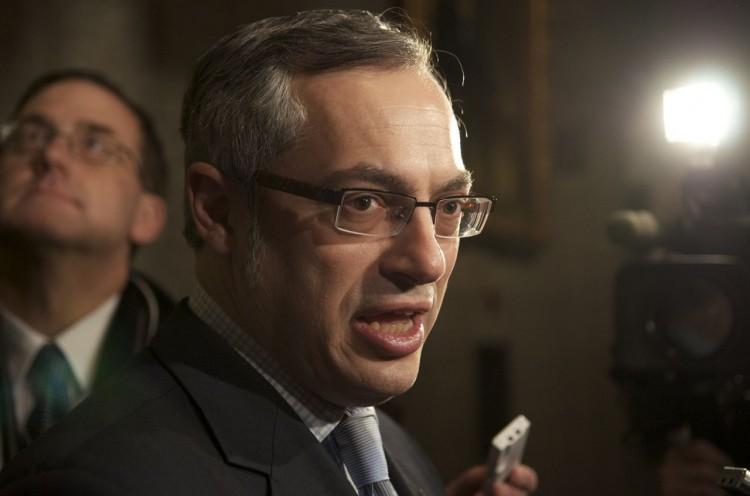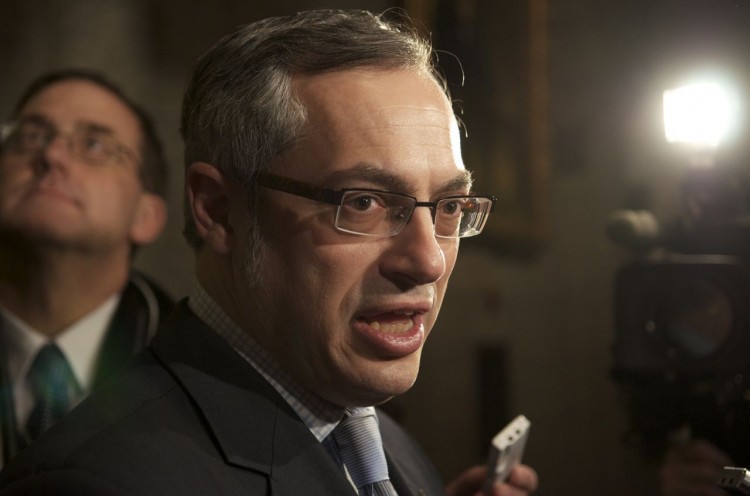PARLIAMENT HILL—Copyright, crime, and controversy are on the agenda for the coming session of Parliament, with the government set on an ambitious agenda that the opposition will try to frame in the worst possible light.
Parliament resumed Monday after Government House Leader Peter Van Loan announced the government’s priorities for the current sittings of Parliament, which include getting its omnibus crime bill through Parliament and modernizing copyright laws—complex legislation the Tories have tried to update twice and the Liberals once before them.
The Conservatives also look set to spend some political capital changing the Old Age Security system, a move that could upset the 55-to-70-year-old demographic that tops Elections Canada’s percentages of voter turnout by age.
Conservative MP Joy Smith made the government’s case for the changes Monday afternoon, noting that Canada will have more seniors than young people within 3 years and the number of Canadians over 65 will double over the next 20 years, from 4.7 million to 9.3 million.
“We also have less workers working toward those taxes. Is it not important to ensure that the OAS continues, but also that we look at the whole program to ensure that we have these very important programs sustained in Canada, not for 5, 10, or 15 years, but for the next 60 years?” she asked.
Prime Minister Stephen Harper was less detailed about plans in answers given during question period Monday, playing for the television news and its eight-second sound bites. Rather than trying to detail his government’s plan, he stayed with a simple line that benefits for seniors won’t be cut.
Van Loan has been more detailed, saying the government was focused on sustaining the program in the medium- and long-term, 10 to 30 years from now, and that changes would not impact current retirees or those about to retire.
Harper took some heat for making the announcement in Davos, which continues a pattern of making major announcements far from Ottawa and pointed questions from the Parliament Hill Press Gallery.
“We have already taken steps to limit the growth of our health care spending over that period. We must do the same for our retirement income system. … We will make the changes necessary to ensure sustainability for the next generation while not affecting current recipients,” Harper said.
Spending Versus Austerity
The PM made the case for pension reform while questioning the responsibilities of some governments that seem more intent on spending than austerity.
“The wealth of western economies is no more inevitable than the poverty of emerging ones, and that the wealth we enjoy today has been based on—and only on—the good, growth-oriented policies, the right, often tough choices, and the hard work done in the past.”
And that is the underlying rationale behind the coming cuts, a logic that worked well for Paul Martin, who took a cleaver to the budget under Jean Chretien and got elected prime minister, briefly, for his efforts.
Treasury Board President Tony Clement highlighted that Wednesday after the Conservative Caucus meeting, telling reporters the government campaigned on a plan to balance the budget.
“We promised that to Canadians, we promised it through the campaign, we promised it since the campaign, we’re going to deliver on that,” he said.
But Canadians’ appetite for austerity could be challenged by some of the government’s other initiatives, including massive tax cuts for corporations, uncosted tough-on-crime legislation, and a stealthy final bill for the new fleet of F-35 jets.
While there is little the NDP can do to stop or even slow what the Conservatives describe as their majority mandate, finance critic Peter Julian has said the party will take the issues to Canadians to stir public opinion against the government.
“It just doesn’t make sense, the expenditure priorities of the Harper government, and what we will be doing front and centre in the House of Commons is pushing what is a very clear alternative to what is cuts for middle class and poor Canadian families and money being spent on the prime minister’s pet projects,” he said.
Free Trade
The government also hopes to finish a free trade agreement with the EU later this year, and get two already-concluded agreements with Panama and Jordan put into action. In addition, the government is working on a free trade agreement with India and entering talks with the Trans-Pacific Partnership, a U.S.-led trade pact that could surpass NAFTA in its significance.
But Ottawa’s true priority is as simple as it is crucial, summed up in three simple words by Steven Blaney, Minister of Veteran Affairs, who took French questions and statements with Van Loan that morning.
“Economy, economy, economy,” he began his remarks.
But the Conservatives also want to reform immigration to focus on economic immigrants and those who can fill labour force needs.
Another possible change could be to MPs’ own pensions, described as “gold-plated” by the Canadian Taxpayers Federation.
The federation says it would take average Canadians an annual savings of $129,000 a year for six years to get the pensions MPs get after putting in $10,990 annually for six years, with the rest of the money being paid for by taxpayers.
The NDP wants an independent board to examine the issue to take it out of the hands of MPs, while the Tories want it looked at by the Board of Internal Economy, the secretive committee responsible for Parliament’s budget.






